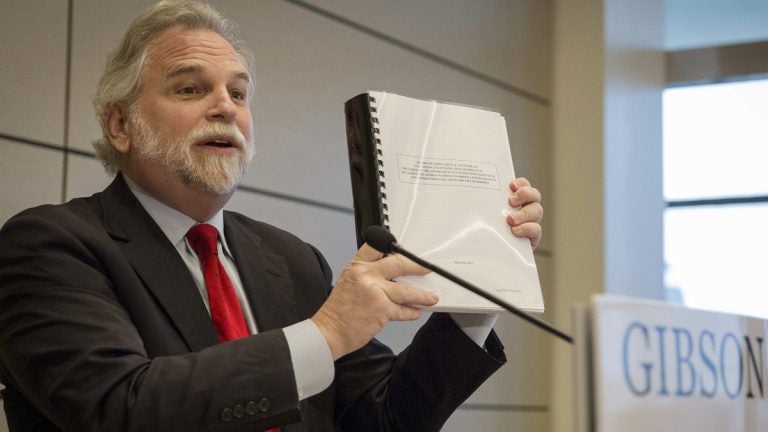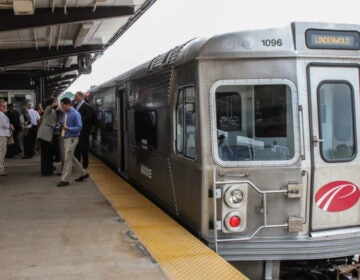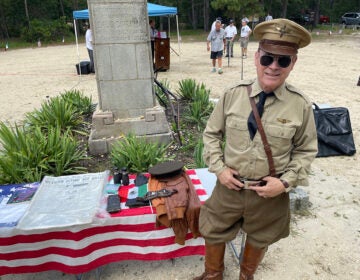Why the Mastro Report creates new problems for Gov Christie

Randy Mastro holds up a copy of his report during a news conference Thursday, March 27, 2014. (AP Photo/Brendan McDermid, Pool)
Gov. Chris Christie took a major political and legal gamble with his decision to ask Randy Mastro and a team of Gibbon Dunn lawyers to conduct an internal inquiry into the Bridgegate and Hoboken allegations in the face of a pair of ongoing probes by a federal grand jury and a legislative committee armed with subpoena power.
Politically, there is no question that the embattled Christie needed the controversial Mastro report exonerating him and his top aides of any wrongdoing in Bridgegate and attacking Hoboken Mayor Dawn Zimmer’s veracity. The release of the report revived his 2016 presidential hopes, protected his chairmanship of the Republican Governors Association, reinvigorated his governorship, and rallied Republican legislators.
Christie’s ebullient personality and forceful tell-it-like-it-is rhetorical style are his greatest political assets. He needed to confront the press and the public if he wanted to stop the continuing skid in his popularity and credibility ratings that followed the January 8 release of Deputy Chief of Staff Bridget Kelly’s explosive “time for some traffic problems in Fort Lee” email and his 10-week self-imposed bunker strategy.
But permitting Mastro’s lawyers to interview Christie and his top aides was a double-edged sword.
On the record
First, it created a body of direct testimony that the U.S. Attorney’s Office and the federal grand jury panel investigating the Bridgegate and Hoboken cases might have taken months to compile, but can now subpoena. The revelation that a federal grand jury has been impaneled for 18 months indicates that U.S. Attorney Paul Fishman believes federal laws may have been broken.
Further, the grand jury’s interview of Christie press secretary Michael Drewniak Friday shows that the U.S. Attorney’s investigation has broadened from its initial focus on Zimmer’s allegations to include Bridgegate because Drewniak has not been mentioned in the Zimmer case. While Zimmer’s lawyer said Drewniak is a witness and not a target, Drewniak’s direct involvement in Bridgegate media strategy from the very beginning may also signal that the grand jury is focusing on whether there was a coverup of the reasons for George Washington Bridge lane closures.
Second, the Mastro team’s interviews with Christie and his top aides make it harder for the Christie administration to invoke executive privilege to refuse to provide testimony on the internal deliberations of the governor’s office to the Joint Select Committee on Investigation when it has already provided that information to the Mastro inquiry, which has made its assessment of those deliberations public.
The Christie administration’s ability to protect those interview tapes and/or transcripts from public scrutiny will be put to the test tomorrow, when the legislative committee co-chaired by Assemblyman John Wisniewski and Senate Majority Leader Loretta Weinberg meets to vote on whether to issue a subpoena to the governor’s office for release of the 70 interviews with Christie, Lt. Gov. Kim Guadagno, and other administration and campaign officials that the Gibbon Dunn team of lawyers conducted.
“There are copious references in the report to the 70 interviews. There are copious statements in the report about ‘so and so said this, so and so said that,’ but there are no footnotes, no documents that we can look at,” Wisniewski said on MSNBC Saturday in explaining the need for his panel to demand the Mastro inquiry interviews. “Essentially, we have to take Randy Mastro’s word for it when we hear about all these interviews because we don’t have any proof or any documentation on them.”
“If we’re going to look at the Randy Mastro report as even being probative of some value, we need to understand the underpinnings of it . . . We don’t have any factual background other than Randy Mastro’s word telling us what Kim Guadagno said,” Wisniewski noted, referring to Zimmer’s allegation that Guadagno transmitted a threat from the governor that he would withhold Sandy aid from her city of Hoboken if she did not approve a high-rise development represented by Christie ally and Port Authority chairman David Samson.
The decision by Wisniewski and Weinberg to press for the interviews sets up a partisan confrontation that will most likely be reflected in a party-line vote on the subpoena for the interviews conducted by Mastro’s team of lawyers.
Assembly Minority Leader Jon Bramnick (R-Union) and Assemblywoman Holly Schepisi (D-Bergen), a member of the investigative committee, both called for the committee to turn over its documents to the U.S. Attorney and the federal grand jury, issue no more subpoenas, and turn its attention to the passage of legislation reforming the Port Authority — the agency that actually shut down the GWB lanes at the direction of David Wildstein, Christie’s third-ranking appointee at the authority.
“It’s time for us to turn the investigation over to law enforcement, and focus on passing legislation to make sure this never happens again,” Bramnick said, noting that Schepisi and the other three Assembly members of the Select Committee on Investigation have already introduced legislation to address ethical practices at the Port Authority.
Christie pledged to cooperate fully with the U.S. Attorney at an hour-long Statehouse press conference 10 days ago following release of the Mastro report, but hedged when asked about the Wisniewski-Weinberg probe.
Advice and ConsentMastro and his Gibbon Dunn team were hired in January not only to conduct an internal inquiry, but also to advise the governor’s office on the release of documents, emails, phone records, and other materials to the various investigations that were then underway. These included not just the U.S. Attorney and the legislative committee, but the Port Authority’s Office of the Inspector General and a U.S. Senate transportation committee.
Wisniewski and Weinberg both noted with considerable irritation that Mastro provided their committee with 4,000 pages of emails and other communications on March 27, the day he had issued his report — even though they had subpoenaed all relevant documents from the governor’s office in late January.
Politically, the legislative committee most likely poses more of a problem for Christie over the next year than the probe by the U.S. Attorney’s Office and the federal grand jury it has impaneled. The latter, whose existence was confirmed last Friday is impaneled to meet for 18 months, and based on the complexity of the investigations into the Bridgegate and Hoboken cases, as well as past practices, it would not be surprising if the grand jury probe took a year or longer.
In the meantime, Christie can continue to point to the Mastro inquiry commissioned by his governor’s office as proof that he, his lieutenant governor, and his current top aides have been exonerated of all wrongdoing — even if most polls show that neither New Jersey voters nor the national electorate believe that he is telling the full truth about his involvement in Bridgegate.
The problem for Christie is that release of the interviews to the Wisniewski-Weinberg committee will enable the panel’s Democratic legislators to pick at the integrity of the investigation — which diverged from accepted federal standards in its coloring of the facts, failure to detail its sources, and lack of independence from the people it was investigating, The Record reported yesterday.
Missing voicesEven more important, release of the interviews — and the list of the 70 people interviewed, which Mastro and the governor’s office have refused to make public — could enable Democrats to cast doubt on the adequacy of the investigation that cleared Christie and his top staff of wrongdoing.
It is not only that the Mastro committee was unable to interview Wildstein, who took the Fifth Amendment before the legislative panel, and Kelly and Christie’s former campaign manager, Bill Stepien, whose Fifth Amendment refusal to cooperate with the legislative investigation will soon be the subject of a ruling by a state judge.
It is also that the Mastro team cleared Christie and his top aides without interviewing a single Port Authority employee. That includes not just an unwilling Deputy Executive Director Bill Baroni and Chairman David Samson, who actively tried to suppress public disclosure of the reasons for the Bridgegate lane closures, as well as Port Authority PBA union chief Paul Nunziato, who claimed in December that the lane closures were his idea, and PBA Lt. Thomas “Chip” Michaels, a friend of the Christie family who drove Wildstein around the first day of the bridge closures.
Similarly, the Mastro team was not able to interview Zimmer or any of her top aides in Hoboken, or Fort Lee Democratic Mayor Mark Sokolich, whose refusal to endorse Christie for reelection was reportedly the reason for the lane closures that Kelly and Wildstein orchestrated.
Moreover, the eventual public disclosure of the interviews with Christie and the senior staff in the governor’s office will raise questions about whether the existence of a pervasive “us against them” mentality during the governor’s 2013 reelection campaign led a core staff made up primarily of veterans of Christie’s U.S. Attorney’s Office to fail to properly investigate the growing body of evidence that the lane closures were not part of a legitimate traffic study — as Baroni insisted in testimony to Wisniewski’s Assembly Transportation Committee in November that went through the governor’s office.
Of particular importance is the testimony of Regina Egea, Christie’s authorities unit director and incoming chief of staff, about why she failed to forward Port Authority Executive Director Patrick Foye’s memo contending that federal and state laws may have been broken by the Bridgegate lane closures — a memo she marked “Importance: High” when she sent it along to her unit’s counsel – up to Christie, Chief of Staff Kevin O’Dowd, and Chief Counsel Charles McKenna.
Also critical is testimony by Christie and O’Dowd on whether they knew that Kelly’s intergovernmental affairs unit was rewarding and punishing mayors — including Democrats Sokolich, Zimmer, and Jersey City Mayor Steven Fulop — based on whether they were providing the expected level of support for the governor’s reelection campaign, and whether that office, under both Kelly and her mentor Stepien, was stepping over the line in doing political work on taxpayer time.
Investigators will want to get McKenna’s testimony to understand why he did nothing more than interview Baroni when Christie asked him and O’Dowd to look into the Bridgegate matter after an October 1 Wall Street Journal article reported Foye’s memo, which came as a surprise to them and to Christie because Egea had not passed it up the chain of command.
Disclosure of interviews with Kelly’s staff, including Matt Mowers, Christine Genovese Renna, and Evan Ridley, would cast an unwelcome spotlight on potentially improper political activities carried out by the intergovernmental affairs unit of the governor’s office, while interviews with Drewniak and other members of the governor’s press office would show clearly how they shaped the administration’s official response to Bridgegate.
If the legislative committee is able to subpoena the Mastro interviews — either because Christie agrees to surrender them voluntarily or because he loses a court battle to block their release — it would give the investigative panel additional reason to summon top Christie administration officials, and perhaps the governor himself, to come in to answer questions raised by their interviews with the Mastro committee.
More than anything else, it is that parade of witnesses that Christie wants to avoid as he fights to reassert himself in the 2016 presidential race and campaigns nationwide raising millions for GOP gubernatorial candidates this year as chairman of the Republican Governors Association.
_________________________________________
NJ Spotlight, an independent online news service on issues critical to New Jersey, makes its in-depth reporting available to NewsWorks.
WHYY is your source for fact-based, in-depth journalism and information. As a nonprofit organization, we rely on financial support from readers like you. Please give today.




